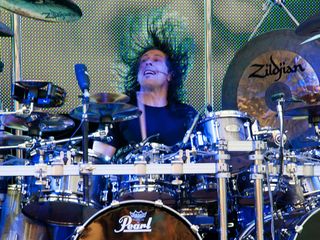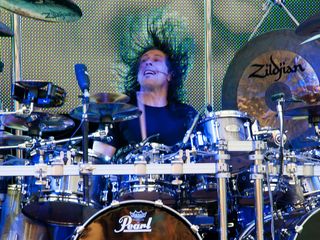
Mike Mangini gives his all on stage with Dream Theater during a European festival show, 2011. © Darko Bohringer.
"Music doesn't lie," says Mike Mangini, Dream Theater's new man on the drum throne. "All it can do is tell the truth. If you listen to A Dramatic Turn Of Events, you can tell that I have total respect for the band and the music, and that my mission was to enhance these amazing musicians and make what they do sound better."
Humble to a fault, Mangini does more on the new Dream Theater disc than simply back up his insanely accomplished frontline. With a heavenly combination of supreme technical chops and infinite musical sensibilities - the man literally oozes groove by just standing still - he puts to rest any notions that the progressive-metal titans were marginalized (or worse, finished) by last year's departure of the equally skilled Mike Portnoy.
On the subject of Portnoy, who in the past week said that he wouldn't rule out reuniting with Dream Theater, Mangini is the embodiment of tact and deference. "I always learned that it was best to praise in public and scold in private," he says. "With Mike Portnoy, it's easy for me to give credit where credit is due. He's amazing. As far as a reunion goes...I can't think about it. Why would I? I have too much to do."
After getting his feet wet performing with the band during a string of summer European festival gigs (headline slots, too - talk about an initiation!), Mangini is looking forward to playing a good portion of A Dramatic Turn Of Events live when the group kicks off their world tour in the US on 24 September in San Francisco.
"I think musicians and Dream Theater fans are going to find what we're doing to be very exciting, very musical," he says. "Some of the things are subtle and extremely nuanced, while others are big and over the top and crazy. It's going to be a lot of fun as it all unfolds."
MusicRadar sat down yesterday with Mike Mangini to discuss how he's changed in the short time he's been with Dream Theater, his approach to recording, some of his theories on drumming (remember, he's a former Berklee instructor!) and perhaps more importantly, what's the one thing that drives him crazy while he plays?
What have you learned about yourself since recording the new Dream Theater record and the summer touring you've done?
"I have learned that I've always had the choice to be who and what I am now, even when I didn't think so. I'm a better listener, on and off the stage, and I'm more in tune with what somebody else thinks and feels.
"Clearly, I've had the choice to be that way since I was seven or whatever. But like anybody, I've had ups and downs and got in my own way. It's like the person you are and the person you want to be are two different things. Being in this band has allowed me to understand the person that was always inside of me, the better person. It's allowed me to choose the best option, and that's been really nice."
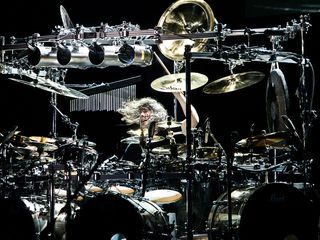
Mangini gets some serious air in the hair at the Rock In Roma Festival, 2011. © luigi Orru / Demotix/Demotix/Corbis
What have you discovered about the band?
"What I didn't expect on one level was more personal. What I did expect on a musical level has happened. Let me explain: On a musical level, the thing that makes us really close - as close as you can be in a very short time - is our love of progression, of trying to be better, of digging in deeper. It's about trying to achieve the ultimate and never giving up. That's what we have in common, and I noticed that from the first day I spent with them.
"On a personal level, they're all extremely respectful and in tune with what's going on around them. They're very mature, and they're in the business of music to make music. They speak highly of other musicians. They give credit where credit is due, and they applaud that which deserves applause.
"We don't sit around and talk trash about this band or that person. The guys in Dream Theater talk about music and pursuing happiness…riffs and instruments…this part versus that part. It's so pleasant. Every night is about moving forward. I don't mean for this to sound so 'rah-rah,' but that's what they're like. They're an extremely passionate, positive bunch.
"It's all in this quote, I don't remember who it's from [editor's note: Eleanor Roosevelt]…'Great minds discuss ideas, average minds discuss events; small minds discuss people.' I really think that's true. Don't spend your time gossiping when you should be doing something."
That said, how have you dealt with some of the haters, the Mike Portnoy-only supporters who diss the band without him?
"Well, I don't really focus on it. But I also look at it the same way that attraction works, meaning it's either God's business or the business of human nature. If you believe in God, then you understand, and if you don't, then you can understand human nature.
"If you're attracted to somebody, it's beyond one's control. It is what it is. So if people are attracted to what Mike Portnoy brought to Dream Theater - as I am, because I'm certainly attracted to it - then that's nature. People are just doing what they do, and that's fine - I applaud them.
"If other people are anti-me because they're pro-Mike Portnoy, there's really nothing I can say or do about that. They're going to think what they think, and it really has nothing to do with my playing. Have they listened to the album? Have they seen the show? In most cases, no. So they're just going on their emotions. That's fine. I can't change that. All I can do is do what I do."
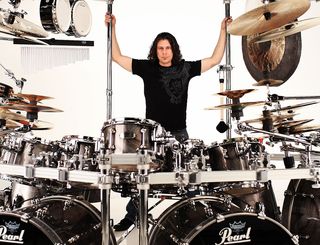
Mangini's to-die-for drum setup is still evolving. © Jeff Ragland
Moving on to your drum kit, have you changed it around from what you were using at the beginning of the summer?
"I'm using my Pearl Reference Pure kit, which is what I used on the European tour, but I'm re-establishing my Pearl e-Pro pads and brain. I used the e-Pro on the album, but not on the song On The Backs Of Angels, which was the only new song we played live over the summer. Now that we're going to be playing other songs that have added percussion, I'll be needing the e-Pro.
"The other thing is that I have to add in the associated slave pedals in order to reach the two kick pads. I have four acoustic bass drums, but on the outside of those, on each side, is one electronic kick. They're not necessarily kick drum noises coming out of them; on Breaking All Illusions, I have cowbells coming out of them. So the hardware has to get added in.
"John Myung requested that I drop my drum riser - actually, I need to follow up on that - which I'm thrilled about, because he wants to establish more eye contact with me. That's the greatest thing that could come out of his mouth. I'm tickled that he would think so much of our situation that he'd want to bond on stage.
"Also, I'm making a major change in drumheads. I'm switching to Remo clear black dots instead of the pinstripes. I used the pinstripes on the new album and the last tour, but they emanate above the 400K range. I'm learning more about the set, and given the microphones, I don't want that frequency. The clear black dots give me a little bit more of the higher end, but they also give me more of the sustained boom. It's a trade-off, but it's one I think will work."
The recording process for the new record - was it a little strange that the tunes were already written, with drum programs mapped out?
"It wasn't strange for me, and I actually welcomed it. It's kind of funny: When John Petrucci called me to tell me that I wasn't going to be around for the writing process, I was elated, and I said, 'John, thank you so much.'
"He was curious about my reaction, and my answer to him was two-fold: Number one, I still wanted to take a lot of time to review the band's catalogue and nurture my drumset. The other thing was, I didn't want to change things right out of the box. The important thing to stress, however, is that John didn't program all the drum parts that I would play, and I didn't play them note-for-note. He created outlines for me. Some things I played as they were, other things I changed, and in some cases he and I tried something totally different. I welcomed working that way."
Were any of the new songs particularly hard for you to nail?
"Hmmm… My answer might not be what you're expecting: This is The Life. Not that it was physically tough to play, but there were a lot of moments where I chose not to play things. That is hard for me because I've mathematically trained my body, all six limbs - that means my mind, my voice and my hands and my feet - to do any combination of between one in 20 notes simultaneously.
"Like any human, there are still more things I can't play than I can. But I've trained myself, using a very special system, to be able to learn to play something very quickly. The point is that all of these rhythms are going through my head at the same time, so I have so many choices at my disposal. The hard thing on This Is The Life was to digest everything and not play."
The unison playing on songs such as Outcry and Build Me Up, Break Me Down - how long did those parts take to get just right?
"Uh…a day! [laughs] However this is going to sound... See, I'm 48 years old, and I've trained very hard. For the past 10 years, I got away from a lot of things and focused on raising a family and being a good dad and husband. Prior to that and since 2010, I've trained myself to be able to learn a song and play it in under two hours.
"Dream Theater songs aren't like that. The old songs take extraordinary periods of time for memorization, and the new songs are no different. Plus, I'm doing something physically ultra-difficult, which is the use of coordination and polyrhythms. This is new for the band."
How exactly do you approach polyrhythms in regards to Dream Theater?
"It's a fairly wide topic, but the number one goal is to be the connective tissue in Dream Theater. For instance, if there are two separate lines being played by any of the other four guys - this includes vocal parts, too - then what I do is tie the band's parts together. By default, this creates other rhythms but not necessarily polyrhythms. Sometimes there are polyrhythms created.
"Now, the way I approach it is, I'm playing in a different time signature than the rest of the band. For example, in the song Outcry, the band is changing time signatures over 10 times during one of the repetitive lines. They're changing between 2 and 3 - two notes and three notes. While they're doing that, I'm also doing it with my feet, but my hands are in 7/16 - a completely different time signature. It's both a math thing, but it's something that's a lot of fun, too."
Being a former teacher, what are your thoughts on the importance of muscle memory awareness, and even the study of the human anatomy, when it comes to drumming?
"These are both primary reasons for the way somebody should practice, and they're also important to know so that somebody is never steered in the wrong direction. These are very important issues. Number one: We're mechanical; we're human beings. If we don't adhere to how we're made, we're going against nature. If we understand how these things work, we're more apt to come out of a room improved.
"On the other hand, human anatomy and muscle memory are the reasons why a jazz instructor who gets a rock player has no right to tell that him to practice and expect him to be a jazz player in a year. I've lived through this. He has no right to offend that student and to make him feel bad about himself or to make him think he has no talent.
"You see, a rock player who has spent many hours practicing has set his muscles a certain way. A jazz teacher trying to break a rock player and make him play another way is going against nature. It's absurd! All instructors need to know that when they start messing with a person's love…they're doing a lot of damage.
"People are people, and students who want to learn something need care and nurturing. I'm not saying that you can't learn to do something else. Of course you can, and it's beneficial. But it takes time. Years! It's like going to college to learn something - and you get four years for that, sometimes longer. In my opinion, jazz is extremely important for rock musicians to learn. Look at John Bonham - his sound was his swing. But again, it takes time. I feel very strongly about this topic."
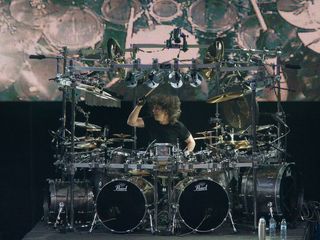
Mangini: "No spotlights, please!" © Darko Bohringer
Drummers can be an eccentric bunch. From what kind of shoes they wear to their drum setups, they're very picky. What are your quirks?
"Let me think, I know I have some… Oh! This is a good one. This is a biggie. The lighting. If there's front lighting on me, like a spotlight, and no backlighting, I literally freeze up. I will grab those sticks so tightly, and I'll wind up with blisters; I'll wind up hurt. There's nothing I can do about it. A direct spotlight on me, that's my kryptonite. It renders me powerless. [laughs]
"I learned why this happens, though. Growing up, I was forced to play for anywhere from 300 to 500 people at weddings. The Mangini family is huge, and back in the day, everybody was invited to weddings. So my parents would pack up my small drum kit, and they'd take me to the wedding hall to play along to Beatles records or jazz records. I hated it! [laughs] I absolutely hated it. I cried and begged them not to make me do it. You know, I was a kid - this was scary for me.
"I remember they would film me while I played, and they had one of those 8mm cameras with the giant floodlight. It was so bright in my face. It was horrifying. I hated it, hated it, hated it!
"Years later, when I was playing clubs in Boston, I realized that there were places where I would play great and places where I would literally have panic attacks. I'd throw up, have bathroom attacks…and always at the same clubs. I got a creative visualization tape, and that's when I figured it all out: every single club where these episodes happened had direct spotlights on me with no backlighting. In my subconscious, I was a kid again at the family weddings."
Needless to say, you've no doubt asked the Dream Theater lighting crew to give you backlighting.
"Yeah, I was talking about this to Dream Theater's lighting engineer, Steve, who's amazing. I said, 'Please, please don't shine that bright light on me on purpose. Whatever you do…' [laughs]
"When I was playing in Steve Vai's band, I played a joke on the lighting guy and painted his fingernails while he was sleeping. Well, he got me back. Not only did he shine that light right in my face, he turned on all the lights over my head so much that they burned my hair. [laughs] He was laughing the whole time. Hopefully, I won't aggravate Dream Theater's lighting man to make him do a similar thing to me."
